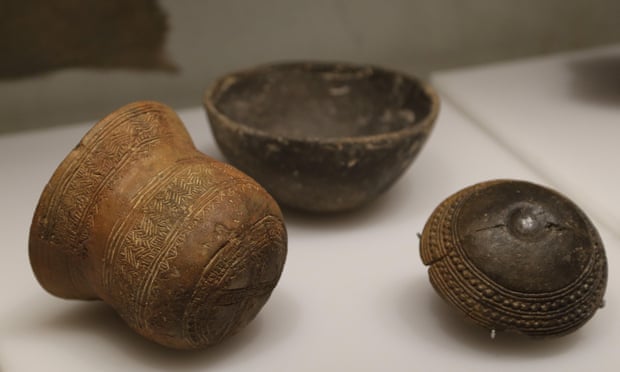 |
| Distinctive bell-shaped pots and beakers gave Beaker folk their name. Photograph: Alamy |
A gene study has shown that incomers could have ousted Stone Age Britons
The men and women who built Stonehenge left an indelible mark on the British landscape. However, researchers have discovered that their impact on other aspects of the nation may have been less impressive. In particular, their input into Britain’s gene pool appears to have fizzled out, having been terminated by light-skinned Bronze Age invaders who arrived just as Ancient Britons were midway through their great Stone Age project. In the end, these newcomers may have completely replaced the people who were building Stonehenge.
This startling conclusion is the result of a huge gene study of humans in prehistoric Europe. It shows that around 2500BC – when the main sections of Stonehenge were under construction – a race of people known to archaeologists as the Beaker folk arrived in Britain. Their genetic profiles were similar to individuals who were living in the Netherlands at the time. In just a short period, all genetic traces of early Stone Age Britons were replaced by those from these continental newcomers, although work on Stonehenge continued. [...] The Guardian / Link 2
Actualización: Descubren cómo fueron exterminados los constructores del Stonehenge - RT
Un equipo internacional de científicos ha identificado los grupos humanos que acabaron con la cultura que levantó el impresionante monumento megalítico británico.
Los hombres y mujeres que construyeron el Stonehenge dejaron un monumento que ya es parte del paisaje y la identidad del Reino Unido. Sin embargo, los investigadores han descubierto que poco ha quedado genéticamente de esta cultura ya que fue exterminada físicamente por invasores procedentes de los actuales Países Bajos en la Edad del Bronce, apunta un artículo del diario 'The Guardian'
Esta sorprendente conclusión es el resultado de un profundo estudio genético de la Europa prehistórica publicado en el portal científico bioRxivl. El estudio demuestra que alrededor del 2.500 a.C., cuando las secciones principales de Stonehenge estaban siendo construidas, un grupo humano conocido por los arqueólogos como el pueblo de Beaker migró en masa a Gran Bretaña. Sus huellas genéticas son similares a las personas que vivían en los Países Bajos en aquel tiempo.
En muy corto período de tiempo, todas las huellas genéticas de los primeros habitantes de Gran Bretaña en la Edad de Piedra fueron reemplazadass por los de migrantes continentales, aunque la construcción del Stonehenge continuó.







1 comentario:
Actualización: Descubren cómo fueron exterminados los constructores del Stonehenge - RT
Publicar un comentario